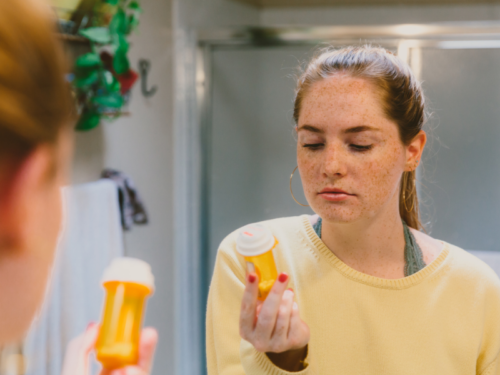
Table of Contents
Signs Your Antidepressant Dose Is Too Low (or Too High)

Written By: Dr. Eli Muhrer, M.D.
July 11, 2024
6 min.
Finding the correct antidepressant dose for you can take some trial and error. Here are some tell-tale signs that your dose is too low or too high.
Learn more about our Clinical Review Process
Table of Contents
If you take an antidepressant, it can be hard to know if you’re on the right dose. Everyone responds differently to these medications, and there’s no one-size-fits-all approach. Finding the ideal dose while treating any mental health condition can be tricky and often requires some patience and trial and error, but it’s super important for your recovery. When you find the right medication and the right dose, antidepressants can truly be life-changing. Here’s what you need to know about antidepressant dosing –– including signs your dose is too low (or too high) and what to do about it.

Begin virtual therapy and medication management today
Fill out our quick form below to learn if Charlie Health is right for you.
Signs your antidepressant dose is too low
Although there are general dosage guidelines from the FDA, dosing can be tricky. You can’t necessarily tell the “right” dose for someone based on their size, age, or anything else you can see from the outside, says Claire Streeter, PMHNP, ARNP, a psychiatric nurse practitioner with Charlie Health. She says that everyone metabolizes and responds to medications differently, which is why finding the right dose can take some trial and error. Here are the two major signs that your antidepressant dose is too low:
1. It’s been several weeks, and you barely have any improvement
If you have given your antidepressant enough time to kick in (at least six weeks of taking it every day) and you feel minimal or no relief, this means the medication dose isn’t working. This lack of improvement can include persistent low mood, mood swings, and other symptoms remaining unchanged, such as high daily anxiety. Antidepressants aren’t just used for depression treatment –– they’re also prescribed for the treatment of generalized anxiety disorder (GAD), panic disorder, post-traumatic stress disorder (PTSD), obsessive-compulsive disorder (OCD), and more — meaning that mental health improvements on the medication look different for everyone.
2. You’re still having persistent, disruptive symptoms, or they come back
If you still have or get the return of persistent symptoms of whatever condition you’re trying to treat after six to eight weeks on the medication, this is a sign that your dose isn’t effective, Streeter says. For example, if you have severe depression and even while taking medication, you still notice a lot of depression symptoms such as feelings of worthlessness, hopelessness, or sadness, your depression medication isn’t doing its job.
Signs your antidepressant dose is too high
On the flip side, it’s also possible that your antidepressant dose could be too high. A higher dose isn’t always better, and this can lead to unpleasant effects. Here are three common signs your antidepressant dose is too high:
1. You feel like a zombie
Streeter says it’s a red flag when her patients say they feel like a zombie from taking their medication. If you feel super tired or in a daze, your dose could be too high. Even if you’re noticing some relief from other symptoms, this excessive drowsiness can interfere with your quality of life and functioning.
2. You feel numb
Feeling numb or experiencing emotional blunting is another sign your dose may be too high, Streeter says. You might feel like you aren’t so bummed out by negative emotions, but at the same time, you may also find it difficult to experience positive emotions and happiness. The range of emotions you experience gets a lot smaller, making life feel more dull.
3. You have intolerable side effects
If you’re having significant uncomfortable side effects, such as daily stomach issues or new difficulty sleeping, your high dose could be to blame, says Streeter. Any antidepressant medication comes with the risk of adverse effects, and when you’re taking a high dose, it’s possible this could contribute to worse side effects. Always report any new adverse effects to your provider.
Additionally, there is a rare possibility that can occur when your dose is too high, which is serotonin syndrome. Serotonin syndrome is when your body has dangerously high serotonin levels. Symptoms range from mild (dilated pupils, tremors, diarrhea) to severe (fever, fast heart rate, seizures, and fainting). This is a rare but potentially dangerous complication that may happen when you take antidepressants that impact serotonin. It’s more likely to happen when you first start taking a medication or when you increase the dose of your medication. If you have any of these symptoms, let your provider know immediately because severe serotonin syndrome can be fatal.
What should you do if you feel your antidepressant dose is wrong?
If you feel like your prescribed antidepressant dose is wrong –– either too high or too low –– do not make any changes yourself. You should never adjust your dose of antidepressant medication or stop taking it altogether unless your provider explicitly tells you to do so. Stopping your meds cold turkey can be dangerous. You could experience antidepressant discontinuation syndrome, complete with withdrawal symptoms.
It’s very important to openly communicate with your prescriber about what’s happening. Streeter says you should let them know if you feel like you aren’t getting symptom relief if you’re having any bad side effects, or if you’re experiencing something like emotional blunting. You want to make sure you’re working with a provider who you trust so you can be honest about everything you’re experiencing. Once you’ve let your provider know what’s going on, they will determine whether they need to:
- Give you a higher dose
- Give you a lower dose
- Add an adjunct/supplemental medication to your current prescription
- Try a different antidepressant medication altogether
Ultimately, your provider will make the call on what’s the best course of treatment for you, along with your input. “Make sure you’ve got that good relationship where you feel like you can be comfortable trusting your provider to help you make the next steps,” Streeter says.
If your provider decides you need to come off of your medication, they will come up with a plan to help you slowly wean off the medication to avoid uncomfortable discontinuation symptoms from antidepressant withdrawal. If your provider decides you need a higher dose, they will slowly increase the dose of medication to reduce the risk of adverse effects.

Different types of antidepressants
If your provider decides that it’s not just the dose, it’s also the medication itself, there are many different medication options to choose from. Here’s a round-up of the different types of antidepressants available:
- Selective serotonin reuptake inhibitors (SSRIs)
- Serotonin and norepinephrine reuptake inhibitors (SNRIs)
- Tricyclic antidepressants (TCAs)
- Monoamine oxidase inhibitors (MAOIs)
- Atypical antidepressants
Again, your provider will make the final decision on what type of medication is best for your mental health condition and symptoms. They will also take co-occurring mental health conditions into account. For example, if you have bipolar disorder, an antidepressant on its own may not be the best fit.
The importance of therapy for mental health
In addition to taking an antidepressant, like an SSRI or SNRI, for your mental health condition, therapy plays a huge role in recovery whether you’re dealing with depression, anxiety, PTSD, OCD, or any other condition. Therapy is a safe space for you to share your thoughts and feelings without judgment, learn coping skills, address underlying causes that may contribute to your condition, and heal from trauma.
Research shows that a combination of both antidepressants and therapy is more effective than just one or the other when it comes to treating mental health conditions like depression. Combining medications with therapy can boost the overall effectiveness of treatment, helping you manage symptoms more effectively, improve your quality of life, and achieve long-lasting well-being.

Therapy and medication management at Charlie Health
If you or a loved one are struggling with a mental health condition, Charlie Health is here to help. Charlie Health’s virtual Intensive Outpatient Program (IOP) provides more than once-weekly mental health treatment for teens, young adults, and families dealing with complex mental health conditions, including mood disorders, depression, anxiety disorders, and more.
Our compassionate clinicians incorporate evidence-based therapies into individual counseling, family therapy, and group sessions. We also offer medication management to clients who could benefit from psychiatric medications, such as antidepressants, in addition to therapy. With this kind of holistic treatment, managing mood swings and recovering from depression is possible. Fill out the form below or give us a call to start healing today.

